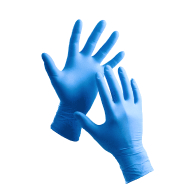Galilee Assembly gloves PU coating
Galilee
visit storeProduct description
According to EN388, CAT II 13 gauge nylon knitted gloves with PU coating on the palm and fingertips, grey/grey
Identifies the protective substances used in construction that determine cut resistance level, comfort, grip quality, and specialized protection properties.
Defines how the glove secures at the wrist, affecting comfort, debris protection, and ease of donning/removal. Options vary in security and coverage.
Suited for diverse tasks, offering reliable cut protection without sacrificing dexterity. Balances safety and flexibility for various applications.
Flexible knit gloves offer dexterity and comfort. Their construction provides a snug fit, enhancing grip and breathability for extended wear.
Offers complete hand coverage, including full finger protection from cuts and abrasions. A versatile style suitable for various tasks and environments.
Indicates the glove's visual appearance, which may signify specific applications, enable color-coding systems, or enhance visibility in work environments.
Identifies the material applied to the glove's exterior that enhances grip, chemical resistance, and durability while complementing the cut-resistant core material.
Indicates the knit density of the glove, affecting dexterity and protection level. Higher numbers offer better finger sensitivity for precision tasks.
- Cut Resistant
- Hand Protection
Request a free sample
Test first and buy later. Visit any product page to request your free sample.
Standards and labels
EN 388:2003 is a European standard for protective gloves against mechanical risks. It sets requirements for resistance to cuts, tears, punctures, abrasion, and impact. Gloves are tested in labs for these properties and the results are shown as a performance level for each test. The levels are marked on the gloves. This standard also includes requirements for gloves' dexterity, comfort and size.
Test results
Cut Resistance, Coup Test Level 1In the standard EN 388:2003, a Cut Resistance, Coup Test result of Level 1 indicates a basic level of cut resistance that the tested material can withstand under specific testing conditions. This result signifies that the material achieved between 1.2 and 2.5 cycles before being cut through during the test. The test method used involves repeatedly impacting the material with a rotating circular blade under constant pressure, until the blade cuts through the material. Blades of normalized sharpness and a standardized force are applied to the sample, ensuring consistency across tests. The testing apparatus records the number of cycles it takes for the blade to penetrate the material. This Level 1 performance implies minimal protection against cuts, suitable for applications where cut risks are relatively low and do not involve exposure to high levels of force or highly abrasive or sharp materials. This level of cut resistance may be ideal for tasks like handling small or less sharp pieces where a high level of dexterity is more important than maximum cut protection.
Abrasion Resistance Level 4In the EN 388:2003 standard, achieving Abrasion Resistance Level 4 signifies that the material has endured 8,000 cycles of abrasion by sandpaper under pressure without forming a hole. This result represents the highest performance level defined within the standard for resistance to abrasion, indicating excellent durability and protection against wear and tear situations in safety gloves .
Tear Resistance Level 3EN 388:2003 is a European standard that specifies methods for testing the resistance of protective gloves against mechanical hazards, such as abrasion, cuts, punctures, and tearing. The Tear Resistance Level 3 indicates a high level of protection, where the gloves can withstand significant tearing forces. The test for determining tear resistance involves subjecting the glove material to a mechanical force until it tears, measuring the force required to initiate and continue the tear. For Level 3, gloves must withstand a force between 50 to 75 Newtons before tearing. This robust level of tear resistance is particularly suitable for demanding environments where gloves are exposed to activities that might cause extensive wear or tearing, such as handling heavy or rough materials, industrial assembly, and construction tasks. Gloves with this level of tear resistance provide enhanced durability and safety, reducing the risk of injuries and increasing the longevity of the glove in tough working conditions.
Tear Resistance Level 1EN 388:2003 is a European standard that outlines the testing requirements for gloves to determine their level of protection against mechanical hazards, including tear resistance. The Tear Resistance Level 1 classification signifies that the gloves offer basic protection against tearing. The test method involves applying a force to a sample of the glove material to tear it, and the force measured reflects the glove's ability to resist tearing. Level 1 tear resistance means the gloves can withstand a force of between 10 to 25 Newtons before tearing. This basic level of protection is suitable for tasks where there is a minimal risk of tearing due to light manual handling or where gloves are used to prevent scratches or minor abrasions. Gloves with Level 1 tear resistance are appropriate for general activities that do not involve handling sharp or jagged materials.
CE Marking is a label that shows a product meets certain safety and environmental standards set by the European Union. To get the CE Marking, a company must test and certify their product meets these standards. CE Marking is required for many products sold in the EU, including electronics, machinery, toys and medical devices. It helps ensure that products are safe for consumers and the environment, and allows for easy trade within the EU.
PPE stands for "personal protective equipment." PPE Category 2 refers to equipment that is more complex, and has a higher level of risk. Examples of PPE Category 2 include safety helmets, ear protection, and fall arrest equipment. In Europe, PPE Category 2 must meet certain safety standards set by the European Union, which means that it must be designed and manufactured to protect the user without causing harm. Companies that make or sell PPE must prove that it meets these standards. They also must have a quality management system in place and have to be audited regularly by a notified body.
Galilee delivery terms
Free delivery for all Galilee products
1 385,18 kr
Price per 20 packages (240 pairs)
5,77 kr / pair
Free delivery
A carton contains 20 packages (240 pairs)
Need larger quantities?
Other products you may like
Recently viewed
Need help?
Get help from our experts
Other products you may like
Similar products you may like
Recommended for you
Galilee
Delivery time: 4 business days
Supplier shipping fee 60,00 €
Free shipping on orders over 1 650,00 €



Find +150,000 products from hundreds of brands
Autonomous sourcing platform
The most efficient way to source and order supplies for your operations
Sourcing
Ordering
List products you’re looking for and we’ll find the best products and prices for you – all for free.
Need help?
Get help from our experts
